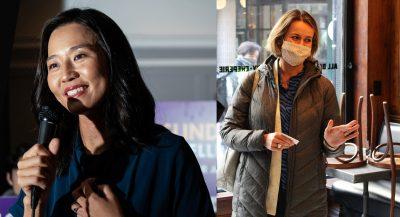
In the last month before the Boston mayoral general election, candidates Michelle Wu and Annissa Essaibi George are vying for key endorsements to solidify their respective campaigns.
As of Oct. 7, Wu received more than 50 endorsements mostly from elected officials, advocacy organizations and unions. Essaibi George has 14 endorsements listed on her campaign website, mostly from unions.
Michelle Wu
In the month since the preliminary election alone, Wu received 11 endorsements from local unions and politicians at the local, state and national levels.
Most recently, Sen. Ed Markey announced his endorsement of Wu via Twitter Wednesday and State Rep. Ayanna Pressley endorsed Wu in a press release last Friday.
Pressley and Markey’s endorsements come days after Acting Mayor Kim Janey endorsed Wu Sept. 25.
“Michelle [Wu] has a passion for service and a vision for our city that is grounded in her own lived experience and belief in the transformative potential of policy,” Pressley is quoted saying in a Friday press release. “At this pivotal moment in our city’s history, we need bold leadership – that’s why I’m so proud to endorse Michelle’s candidacy for Mayor.”
Erin O’Brien, associate professor of political science at the University of Massachusetts Boston, wrote in an email that Pressley’s endorsement solidifies Wu’s position as a strong progressive leader.
“The Ayanna Pressley endorsement is solid gold in the Boston mayoral race,” O’Brien wrote, later adding that “Pressley’s endorsement of Wu helps those progressive and democratic organizations in making their choice on both whether or not to endorse and who to endorse.”
Markey noted Wu’s leadership in tackling climate change and equity in the city as reasons for his endorsement.
He also cited Wu’s Green New Deal for the City of Boston, released August 2020. “Michelle Wu will make Boston a Green New Deal city and position us to lead the national movement for climate action,” he said in a Wednesday press release.
The union UNITE HERE New England Joint Board chose to endorse Wu in June based on how her progressive policy matched their needs for protections, looking especially at working conditions for immigrants, women and people of color, said communications and political director for NEJB, Mitchell Fallon.
“We really look to Michelle as someone who isn’t just thinking so specifically about the City of Boston but the impacts that the City of Boston has on the region and on the Commonwealth and on a national stage,” Fallon said. “[Boston] can be a powerhouse in creating solutions on these issues as well, and that’s what Michelle Wu really brings to the table.”
Annissa Essaibi George
Unions from the construction, trade, first responder and healthcare industries make up 13 of 15 of Essaibi George’s endorsements for mayor, with former Police Commissioner William Gross and State Rep. Kevin Honan, (D-17), as the remaining two.
For Essaibi George to catch up to Wu in the number of endorsements, she will have to find a message that gives her a “strategic advantage” in the race, David Hopkins, associate professor of political science at Boston College, said.
“When you’re losing a race, what happens is you start making attacks with whatever materials at hand and you hope some of it resonates with voters,” he said.
Katie Murphy, president of the Massachusetts Nurses Association which endorsed Essaibi George in March, said Essaibi George reached out to them “very early,” and supports the changes they want to see in the healthcare system — such as nurses in every school, addressing the opioid crisis and safe patient limits — causes they say Essaibi George has already begun in her work as a city councilor.
“She was really a strong, strong supporter,” Murphy said. “This is our major focus because certainly in the pandemic it really highlighted and exacerbated the failures of the healthcare system.”
Now that Essaibi George made it through the preliminary election, supporters like Murphy are confident in her campaign.
“Whenever I see her or whenever I’m with her, she’s very authentic,” she said. “She really speaks from the heart and really will address an issue if people ask her about voting or housing or jobs … I think that resonates with voters.”
Electoral Effects
Voters could be persuaded by other factors such as political ideology or social identity in addition to the influence of endorsements, Hopkins said.
“If voters perceive that one candidate is more like them in some way than others, that’s a very popular basis of choosing to support that candidate,” he said.
Hopkins added that having more endorsements gives candidates an edge in elections because of the “bandwagon” effect — individuals vote for the candidate with the most support to be in line with the majority.
“It doesn’t necessarily mean that the endorsement itself was decisive, but that most politicians don’t like to back the losing horse in a race,” he said.





















































































































